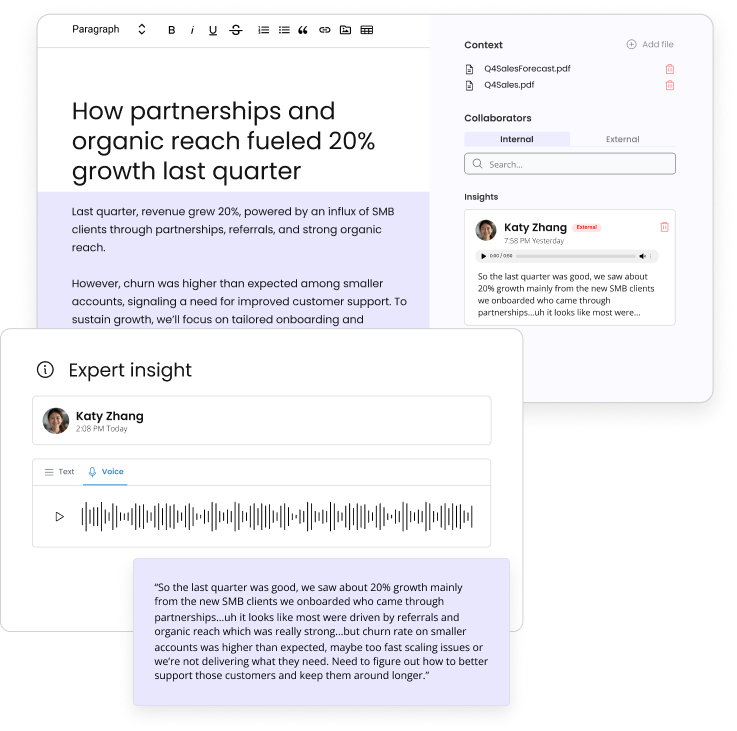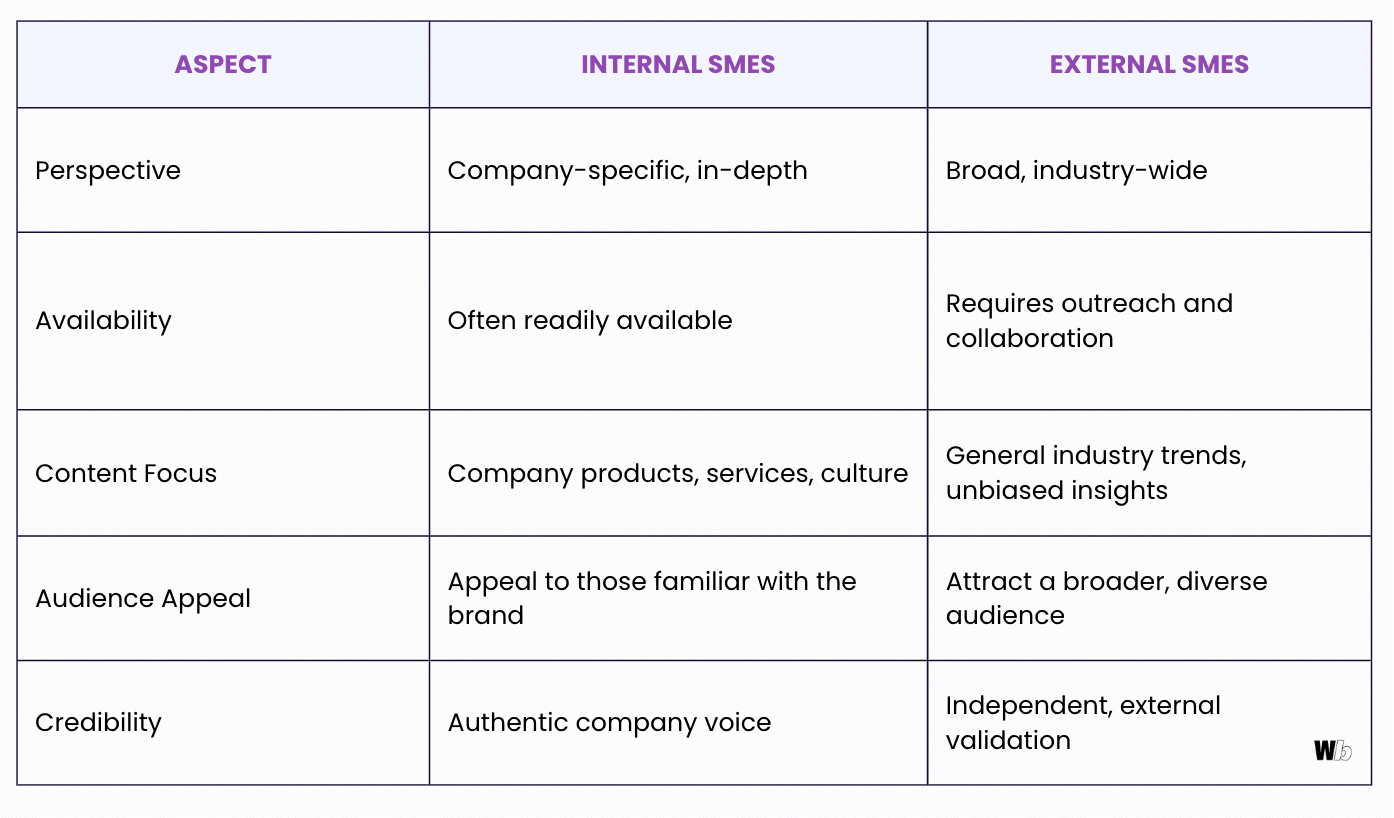Table of Contents

Authority scales when expertise comes first
Wordbrew helps teams collect expert insight before AI ever writes a word.
Built for expert-led, review-safe content
- Home
- »
- Hybrid Content
- »
- How subject matter experts improve content quality
-
Muhammad Umer
- 9 minutes read time
How subject matter experts improve content quality
- Home
- »
- Hybrid Content
- »
- How subject matter experts improve content quality
How subject matter experts improve content quality
Table of Contents

The advantage of integrating subject matter experts into content development is twofold.
First, their deep understanding of specific topics ensures accuracy and comprehensiveness. This is vital in an era where misinformation can easily spread.
Secondly, they can offer unique perspectives that resonate with audiences seeking in-depth and reliable information.
Subject matter experts (SMEs) are born from years of experience and a dedication to their area of specialization. Content marketers can effectively produce material that informs, engages, and educates their audience when relying on this expertise.
This article explores:
- The concept of SMEs
- The difference between internal and external SMEs
- Strategies for finding them
- The kinds of content they can help produce
- Google’s perspective on the value of expert-driven content
Through this, we aim to provide you with a thorough guide to elevating content quality using the invaluable resource of subject matter experts.
What are subject matter experts?
Subject matter experts (SMEs) have a profound and robust understanding of a particular domain. Their expertise typically results from extensive experience, education, or a combination of both in their specific field.
This proficiency enables them to provide detailed insights and a depth of knowledge that goes beyond general understanding.
Why use SMEs?
SMEs bring fresh perspectives to common topics, making the content more engaging and insightful. This level of detail is essential in creating content that is both informative and trustworthy.
For example, a blog post about sustainable living written by an environmental scientist will include unique perspectives on recycling and energy conservation. This will attract a wider audience interested in authentic, expert-backed information and turn a common topic into a compelling read.
Their specialized viewpoints often reveal aspects of a subject that a general writer might overlook. This can be particularly beneficial in evolving or complex fields like medical technology, where keeping up-to-date with the latest developments and trends is crucial.
Their impact on content performance
Incorporating SMEs into content creation will also help you align with Google’s emphasis on experience, expertise, authoritativeness, and trustworthiness (E-E-A-T).
In short, the input of an SME will improve your content’s quality and performance altogether.
What’s the difference between internal SMEs and external SMEs?
Understanding the distinction between internal and external subject matter experts (SMEs) is key in content marketing. Each type offers distinct benefits and has different implications for content strategy.
Internal SMEs
Internal SMEs are experts within your organization. They deeply understand your company’s products, services, and the industry landscape. Their insights are especially valuable in creating content that reflects your brand’s unique perspective and values.
Internal SMEs are often more accessible for content collaboration and can provide quick responses to industry changes or company updates. Their ongoing involvement in your business processes and culture adds more authenticity to the content.
External SMEs
External SMEs, on the other hand, are experts from outside your organization. They bring an independent perspective, which can be particularly useful in adding credibility and diversity of thought to your content.
External SMEs can also help reach new audiences and expand your content’s appeal. Their expertise, drawn from a wider industry or academic background, can provide a broader context to your content, offering insights that might not be available within your organization.
A brief comparison
While internal SMEs offer an in-depth understanding of your company and its offerings, external SMEs provide a broader industry perspective and external validation. The choice between the two depends on your content goals, the topic, and your target audience.
Here’s a table to further clarify the difference:

Which types of content can be produced using subject matter experts?
Subject matter experts (SMEs) can significantly enhance a variety of content formats, each offering unique benefits to your content marketing strategy.
Blogs
SMEs can transform blog posts into rich, informative pieces. Their knowledge ensures accuracy and depth, making the content more valuable for readers seeking expert insights. For example, an SME in renewable energy can offer a detailed analysis of the latest industry trends, making a blog post informative and a go-to resource for the audience.
White papers
White papers are exhaustive, informative documents often used to educate the audience on complex issues or to propose solutions. An SME’s in-depth understanding can lend credibility and substance to a white paper.
For instance, an SME in cybersecurity can provide comprehensive insights into emerging threats and protection strategies as opposed to a general writer who will stick to what others have already covered.
Webinars
Webinars offer a platform for real-time interaction with an audience. An SME leading a webinar can provide expert advice, answer questions, and discuss industry developments.
For example, a financial analyst SME hosting a webinar can share real-time insights into market trends, offering immense value to the audience.
Podcasts
In podcasts, SMEs can discuss topics conversationally, making complex subjects accessible and engaging for everyone. For example, a podcast featuring an SME in health and wellness can unveil the latest in nutrition science. This untapped information can attract listeners looking for credible, in-depth information.
Working with SMEs across these content types enriches the information presented and positions your brand as a reliable source of expert knowledge. Their contributions ensure that the content captures the audience’s interest and sustains it with useful, accurate, and authoritative information.
How to find subject matter experts for your content
The process of finding the right subject matter experts differs slightly for internal and external SMEs.
How to identify internal SMEs
Finding internal SMEs is a straightforward process since you’ll be searching within your talent pool. However, this very reason also confines your ability to find the right subject matter expert.
Here are four approaches you can take to identify the right subject matter expert within your team:
- Look for employees with extensive experience or specialized roles related to your content topics.
- Speak with team leaders or department heads. They can identify individuals with deep knowledge in specific areas.
- Examine previous company projects or publications. Employees who have contributed significantly to these might be potential SMEs.
- Encourage employees to suggest potential experts within the organization. Sometimes, the best SMEs are identified through colleague recommendations.
We suggest trying out all four approaches to increase your chances of finding the right subject matter experts. If the same profile gets highlighted through multiple approaches, rest assured you’ve found the right expert.
4 approaches to finding external SMEs
Searching for external SMEs may take a while, but it’s still preferred since you get to tap into a larger pool of talent, increasing your chances of landing the perfect SME for the task.
Here are four ways to find the right external subject matter experts:
- Use LinkedIn or other professional networking sites to find experts in the field. Look at their publications, endorsements, and experience.
- Attend industry events. These are excellent places to meet and network with potential SMEs.
- Reach out to universities or research institutions. Professors or researchers often have the expertise you need.
- Identify the authors of articles or studies in your field. They are often willing to share their expertise.
A fifth, much easier and more effective way to find the right external SMEs is through dedicated websites.
Sites like Wordbrew have a large talent pool of experts in various industries. This makes it easier for you to connect with the best subject matter experts on the market.
Selecting the right SME
You have a list of names with you. All of them have great profiles and relevant experience. Now, how do you select the right SME for your business?
Choosing the right SME involves evaluating their expertise and fit with your content goals.
Here are three ways to do so:
- Consider your specific content needs. Do you require in-depth technical proficiency or a broad industry overview?
- Assess the SME’s communication skills. Can they convey complex ideas in a way that’s understandable for general audiences?
- Ensure the SME aligns with your audience’s interests and your brand’s values.
These considerations will help you finalize and pick the right subject matter experts.
A step-by-step guide to improving content with subject matter experts
The journey doesn’t end at finding the right SME—you have to ensure they can add unique flavor to your content.
Improving content with the aid of subject matter experts (SMEs) is a strategic process that can significantly enhance the value and appeal of your content.
Here is a step-by-step guide on how to effectively leverage SMEs to elevate your content:
1. Define clear objectives and audience understanding
Understanding the intent behind your content and the audience’s comprehension level is imperative. Your SME will add their expert touch to the content accordingly.
Remember: Your content shouldn’t just reach them. It should also resonate and foster a deeper connection and engagement with them.
Clarity of your content goals is also critical. Defining precisely what you aim to achieve with each piece of content sets a clear direction for your efforts. It will put your SMEs in the right direction, allowing them to share a level of knowledge that’s more understandable for the audience.
Whether your goal is to educate the audience, address specific queries, or offer new insights, having these objectives well-articulated will streamline your collaboration with SMEs and ensure that every piece of content is purpose-driven.
This focused approach guarantees that your SME’s expertise aligns with your strategic goals effectively.
2. Select the right experts
Expertise in a field is important, but there’s more to finding the right people for your content.
A truly effective SME is someone with the unique ability to articulate complex concepts in an engaging, understandable way. This skill is invaluable in transforming intricate topics into captivating content that resonates with your audience.
Equally important is the verification of their credibility. An SME should be more than just knowledgeable; they should be recognized and respected in their field. This can be assessed through their professional background, industry contributions, and published work. Their authority and reputation lend an added layer of trust and authenticity to your content.
Integrating these considerations into your selection process can significantly enhance your content’s impact and value, making it a powerful tool for engaging and educating your audience.
3. Collaborate on content development and format diversity
Collaborative content development is a dynamic process that thrives on the teamwork between you and the subject matter expert. Imagine engaging in joint writing sessions, insightful interviews, or thought-provoking discussions.
This partnership enriches the content and infuses it with an original blend of perspectives.
Whether crafting compelling articles, producing engaging videos, hosting informative podcasts, or designing eye-catching infographics, each format offers a unique way to connect with your audience.
Collaborative content ensures that you cater to the varied preferences of your audience, making your content accessible and enjoyable for everyone.
To truly resonate with your audience, incorporate real-world examples into your content. Invite the SME to share relevant case studies, personal anecdotes, or specific scenarios they’ve encountered.
These stories add depth and authenticity to your content, making complex ideas more tangible and relatable.
4. Promote, analyze, and refine
In content strategy, the journey doesn’t end with creation. It extends into promotion, analysis, and refinement. Think of your content as a message, and you have a spectrum of channels at your disposal to amplify this message. Share it across the digital landscape—be it through social media platforms, professional networks where ideas brew, the personalized space of email newsletters, or the central hub of your website.
Each channel casts your content far and wide and reaches every corner of your intended audience.
Then comes the analytics. Engage with tools that offer insights into how your audience interacts with your content. Dive into metrics like views, shares, comments, and the time your audience spends with your content. These numbers tell a story, revealing what resonates with your audience and what doesn’t.
To top it off, listen to the audience and analyze their reactions. This feedback can help you refine your future content strategies. It could mean shifting tone, experimenting with different formats, or even rethinking the types of SMEs in which you collaborate.
Tuning into this feedback and adapting accordingly ensures that your content constantly evolves with the needs and interests of your audience.
Following these four steps can significantly improve your content’s quality and effectiveness. The right SME can bring the level of depth and authenticity that resonates with your audience while the continuous process of analyzing and refining makes your content relevant and impactful.
Google’s stance on using experts for content creation
Google’s approach to content emphasizes the importance of expertise, particularly when it comes to topics where accurate and trustworthy information is crucial. This perspective aligns well with using subject matter experts in content creation.
These guidelines particularly highlight the value of content created by individuals with demonstrable knowledge in their field through Experience, Expertise, Authoritativeness, and Trustworthiness (E-E-A-T).

Source: Google
This is especially relevant for “Your Money or Your Life” (YMYL) topics, such as finance, health, and safety, where accurate information can significantly impact readers’ lives.
Google’s algorithms tend to favor content showcasing expert knowledge and credible information sources, enhancing search visibility and user trust.
In a nutshell
Incorporating subject matter experts into content creation directly contributes to improving E-E-A-T and demonstrating authority with high-quality content.
Content marketers who work with SMEs can be confident that if their content adheres to Google’s quality guidelines, it will be reliable and informative for the audience. This approach also aids in achieving better search rankings and establishing the brand as a trusted authority in its field. In the long run, such a collaboration between SMEs and marketers fosters a loyal audience base that values and trusts the content.
Tap into a pool of vetted SMEs
Finding the right external SMEs for your content can be a tedious process. Let Wordbrew make it easier.
We have a network of subject matter experts from various industries and backgrounds, helping businesses like yours create truly valuable content—that, too, at scale.
